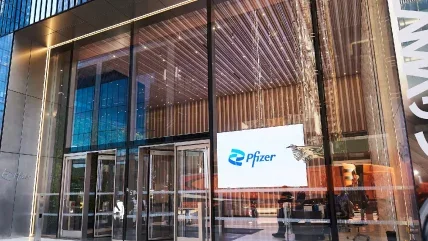
US-based pharmaceutical firm Pfizer has announced positive results for sasanlimab, a PD-1 inhibitor, combined with Bacillus Calmette-Guérin (BCG), in the Phase 3 CREST trial.
In the Phase 3 trial, the PD-1 inhibitor significantly improves event-free survival (EFS) in patients with high-risk, BCG-naïve non-muscle invasive bladder cancer (NMIBC).
The combination showed a 32% reduction in the risk of disease-related events, high-grade disease recurrence or progression, compared to BCG alone, which is the primary endpoint.
The EFS was defined as the time from randomisation to the earliest recurrence of high-grade disease, disease progression, carcinoma in situ (CIS) persistence, or death.
Pfizer Oncology interim chief development officer Megan O’Meara said: “Today’s pivotal Phase 3 CREST results offer a much-needed therapeutic breakthrough and spotlight sasanlimab as the first immunotherapy combination with BCG to significantly improve outcomes for patients with BCG-naïve, high-risk NMIBC in over three decades.
“The CREST findings are especially impactful for these patients with early-stage cancer who may benefit the most from innovative treatment regimens, including a subcutaneous immune checkpoint inhibitor, that delay disease recurrence or progression.
“These results underscore our long-standing commitment to patients with bladder cancer across all stages of the disease.
“We look forward to working with global regulatory authorities to potentially bring sasanlimab as an important new treatment option to patients with high-risk NMIBC.”
Pre-specified subgroup analyses indicated consistent benefits for patients with higher-risk disease, with an EFS hazard ratio (HR) of 0.63 for T1 disease and 0.53 for CIS disease.
At 36 months, the probability of being event-free was 82.1% with the combination therapy, compared to 74.8% with BCG alone.
The combination did not extend EFS compared to BCG alone, a key secondary endpoint.
Early interim analysis for overall survival (OS) showed no difference between treatment arms, with a median follow-up of 40.9 months.
The study, which will continue with survival follow-up until the final analysis, showed that sasanlimab plus BCG was safe and consistent with known data for BCG and PD-1 inhibitors.
CREST trial lead investigator Neal Shore said: “New bladder cancer treatment options that help reduce rates of disease recurrence or progression are long overdue.
“Up to 50% of patients with high-risk non-muscle invasive bladder cancer may experience failure of BCG intravesical immunotherapy, yet it has been the standard of care after tumour resection for decades.
“These Phase 3 results show that combining sasanlimab with BCG induction and maintenance therapy earlier in the course of the disease significantly prolonged event-free survival, highlighting the value and potential of sasanlimab in combination with BCG to redefine the treatment paradigm and reduce the burden for patients.”






